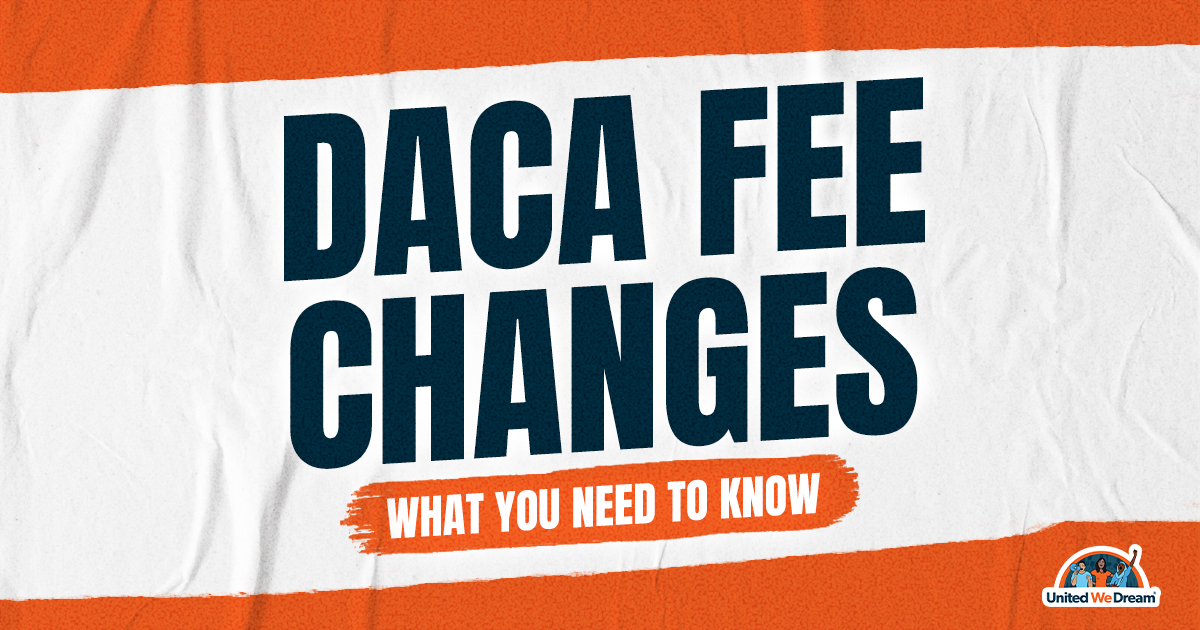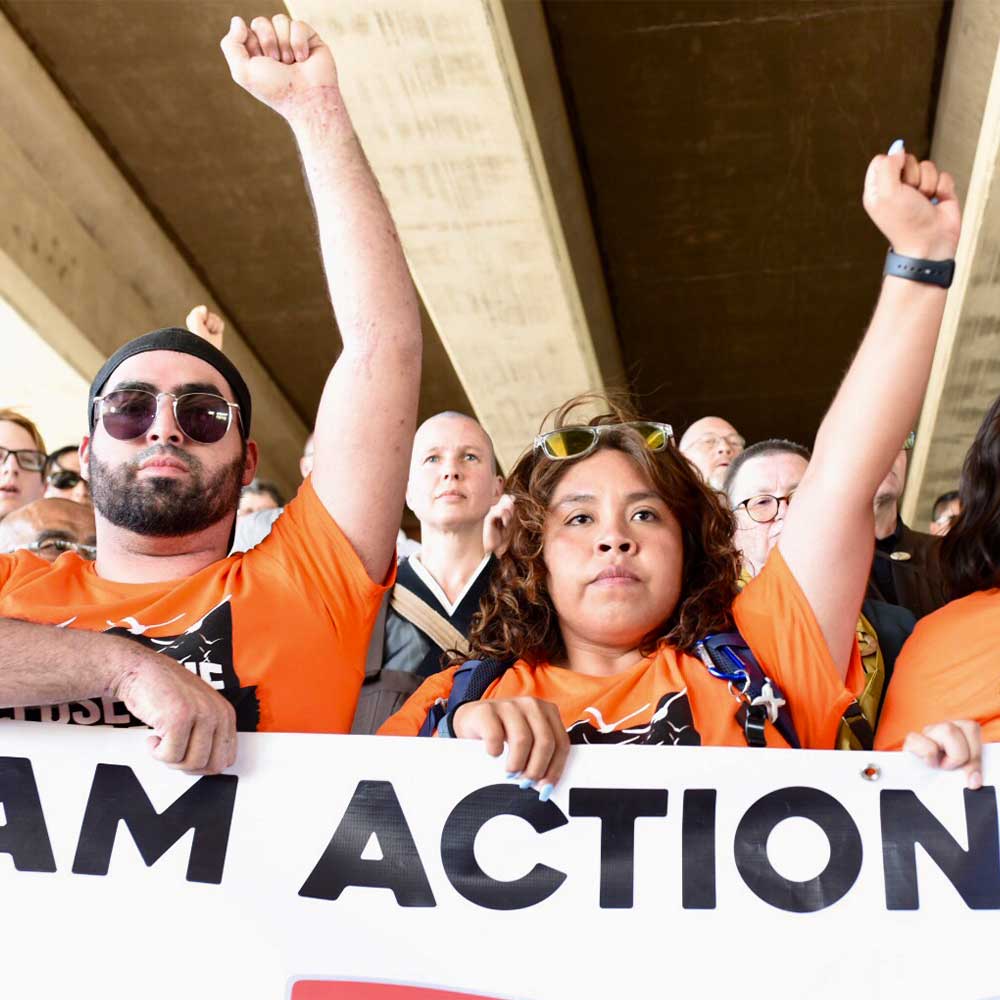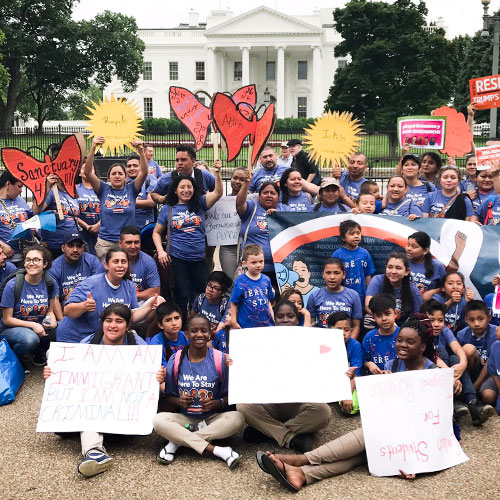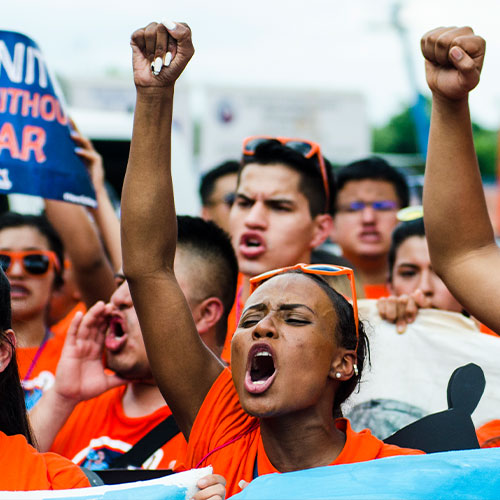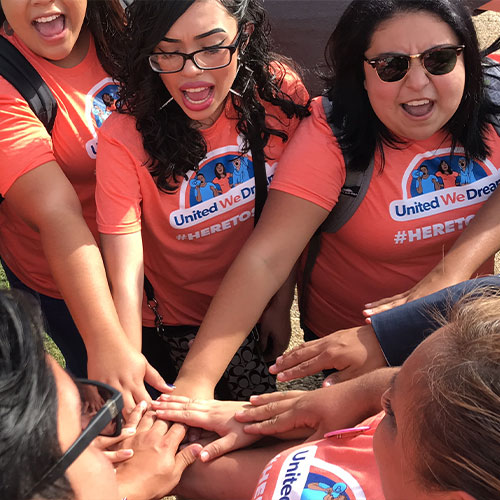Over the past eight years, and despite relentless attacks and efforts by the Department of Homeland Security to end the program, DACA has had an outsized positive impact on the roughly 826,000 young people who have received the status.
From August 18 to September 10, 2020, Tom K. Wong of the U.S. Immigration Policy Center at the University of California, San Diego; United We Dream; the National Immigration Law Center; and the Center for American Progress fielded a national survey to further analyze the experiences of DACA recipients. This study includes 1,157 DACA recipients in 44 states as well as the District of Columbia. This is the sixth consecutive year that we have surveyed DACA recipients.
The first part of our survey results found that DACA continues to be a lifeline for hundreds of thousands of immigrant youth, as well as their families and their communities. At the same time, recent changes to the DACA program — in particular, having only one year of protection from deportation instead of two, which doubles the costs of DACA as recipients will have to pay to renew their status annually — threaten to undo the economic and educational gains DACA recipients have made. Moreover, given delays in processing renewal applications, having only one year of protection could also lead many DACA recipients to lose their status despite following the new rules.
This column lays out both the fears that DACA recipients have about losing their status, as well as how DACA recipients have been affected by COVID-19 pandemic. We also show that, even amidst the uncertainty, DACA recipients are still hopeful and fired up to fight back.
The Uncertainty of DACA
The legal and political uncertainty surrounding DACA continues to weigh heavily on the minds of DACA recipients, particularly among those with children. Among those with children, 76.6 percent reported that they think about “being separated from my children because of deportation” at least once a day and 72.8 percent think about “not being able to see my children grow up because of deportation” at least once a day.
Moreover, whereas 62.1 percent reported, “I am no longer afraid of my immigration status” and 63.0 percent reported “I feel more like I belong in the U.S” because of DACA, both of these percentages have decreased since we last surveyed DACA recipients last year.
Without protection, DACA recipients will be less engaged in society
We embedded a survey experiment into the questionnaire. DACA recipients were randomly assigned to two conditions: a control condition and a treatment condition. In the control condition, respondents were asked, “How likely are you to do the following.” In the treatment condition, respondents were asked, “If you no longer had DACA, how likely are you to do the following?” The differences are stark. Without DACA, recipients would be:
- 30.6% less likely to report a crime they were a victim of to the police;
- 42.8% less likely to use public services that required them to disclose their personal contact information;
- 58.0% less likely to do business (e.g., open a bank account, get a loan) that required them to disclose their personal contact information;
- 32.0% less likely to participate in public events where police may be present;
- Those with children are 25.1% less likely to place their children in an after-school or day-care program;
- 49.6% less likely to report wage theft by their employer;
- Those in college are 56.9% less likely to continue their education;
- 67.4% less likely to pursue new educational opportunities if needed;
- 39.3% less likely to seek treatment or testing for COVID-19.
These data show what the stakes of ending DACA are, as they make vivid the myriad number of ways that taking DACA away would not just negatively affect the economy, but also what the broader ripple effects across society would be.
Deporting DACA recipients risks causing serious harm
The survey results show stark consequences for what might happen if DACA recipients lose their status and are deported back to their home countries.
- A full 81.6 percent reported, “In my country of birth, I would be concerned about the physical safety of myself and my family”;
- 78.8% reported, “In my country of birth, I would be concerned about the quality of healthcare for myself and my family”;
- 72.9% reported, “In my country of birth, I would be concerned about the quality of education for myself and my family”;
- 57.6% reported, “In my country of birth, I would be concerned about food insecurity for myself and my family”; and
- 40.9% reported, “In my country of birth, I would be concerned about homelessness for myself and my family.”
Altogether, 93.9 percent of respondents reported concerns about their and their family’s physical safety, healthcare, education, food insecurity, or homelessness in their respective countries of birth. Combined with the fact that the average age of arrival to the U.S. among DACA recipients is just 6.5 years old, these findings make clear that, if deported, not only would DACA recipients be removed to countries they barely know, but they would be deported to places where their and their families’ physical integrity and livelihoods would be at risk.
DACA recipients and the COVID-19 pandemic
Like most Americans, DACA recipients have been grappling with the devastating economic impacts of the COVID-19 pandemic. Of respondents who are currently employed, 25.8 percent, reported having either their work hours or pay reduced due to the COVID-19 pandemic. Among respondents who are currently not employed, 45.1 percent reported that they lost their job due to the COVID-19 pandemic.
Moreover, among homeowners, 18.9 percent reported difficulties paying their mortgage during the pandemic. Among non-homeowners, 32.4 percent reported difficulties paying rent during the pandemic and 2.9 percent have been threatened with eviction.
Also, underscoring the importance of the intersection of immigration status and economic recovery, nearly one-quarter of our respondents, 24.0 percent, reported having someone in their home who was denied a stimulus check, even though they were otherwise eligible, because their spouse or parents filed taxes with an Individual Taxpayer Identification Number (ITIN).
The civic engagement and fight for racial justice among DACA recipients
At the same time, and despite these challenges, the data also continue to show tremendous resolve among DACA recipients. As the November 2020 general election draws nearer, a full 94.4 percent reported that they plan to use their voice to encourage family members or friends who are eligible to vote to do so. Nearly half of respondents, 46.1 percent, reported that they have become more politically active since receiving DACA. This includes 33.9 percent of respondents who reported that they contacted or tried to contact a member of Congress during the past 12 months and 30.0 percent of respondents who reported that they contacted or tried to contact a state or local elected official. It follows that the majority of respondents, 52.0 percent, reported that they have become more involved in their communities after receiving DACA.
Moreover, against the backdrop of our collective, national reckoning when it comes to racial injustice, 89.6 percent reported that they support or strongly support the Black Lives Matter movement. This support has also translated into action, as 41.2 percent reported that, during the past 12 months, they had participated in a campaign to protest the killing of Black people. An additional 26.6 percent reported making calls to law enforcement authorities or elected officials. An even higher percentage, 81.3 percent, reported signing a petition and 56.6 percent donated to an organization that advocates for racial justice and equity.
Conclusion
DHS’ continued attacks on DACA are weighing heavily on the minds of DACA recipients. These anxieties are palpable and speak to the rootedness of immigrant youth for whom losing protection from deportation and the ability to work is not an option. At the same time, even amidst these fears, DACA recipients remain resolved and are fighting not only for their own futures, but for racial justice for all. This November, the lives and safety of DACA recipients are on the line.
Tom K. Wong is associate professor of political science and founding director of the U.S. Immigration Policy Center at the University of California, San Diego, and a senior fellow at the Center for American Progress. Sanaa Abrar is advocacy director, and Juliana Macedo do Nascimento is state and local policy manager at United We Dream, Ignacia Rodriguez Kmec is immigration policy advocate at the National Immigration Law Center. Tom Jawetz is vice president for Immigration Policy, Claudia Flores is the immigration campaign manager, and Philip E. Wolgin is managing director for Immigration Policy at the Center for American Progress.
The authors thank all those who took and shared the survey for their time and effort in helping to bring these stories to light. Wong would also like to thank Maya Lu for her research assistance.
METHODOLOGY
The questionnaire was administered to an online panel of DACA recipients recruited by the partner organizations. Several steps were taken to account for the known sources of bias that result from such online panels. To prevent ballot stuffing—one person submitting multiple responses—the authors did not offer an incentive to respondents for taking the questionnaire and used a state-of-the-art online survey platform that does not allow one IP address to submit multiple responses. To prevent spoiled ballots—meaning, people responding who are not undocumented—the authors used two validation tests for undocumented status. Multiple questions were asked about each respondent’s migratory history and DACA application history. These questions were asked at different parts of the questionnaire. When repeated, the questions were posed using different wording. If there was agreement in the answers such that there was consistency regarding the respondent’s migratory history and DACA application history, the respondent was kept in the resulting pool of respondents. If not, the respondent was excluded.

